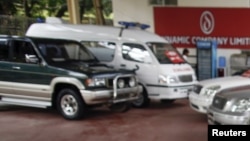As the majority of people struggle daily to put bread and butter on the table, streets in Zimbabwe are full of top of the range Mercedes Benz, BMWs, Range Rovers and other expensive vehicles.
Owners of these vehicles say these cars are a status symbol.
A closer look shows that these vehicles are owned by businessmen, top executives of private and state companies as well as lawmakers and ministers.
Phillip Chiyangwa is one of the people well-known for owning several cars including a monstrous Hummer, $500,000 limousine, seven-passenger Mercedes Benz which cost him $400,000 and was handcrafted at German’s Affalterbach factory that manufactures supercars, and several others.
Chiyangwa could not be drawn to talk about his most-prized possessions, saying he is undergoing treatment for some minor ailment.
Information Technology expert, Chris Musodza, who drives a Mercedes Benz, says businesspeople have the right to buy anything of their choice because they work hard.
Musodza says it is morally wrong to use state funds to purchase such vehicles when millions of people cannot have a decent meal a day.
A director of a local company, who does not want to be named, echoes the same sentiments, noting that he drives a Jeep Cherokee instead of a Toyota Vitz as way to sympathize with Zimbabweans currently struggling to make ends meet.
POVERTY DATUM LINE
Apart from businesspeople, church leaders like Emmanuel Makandiwa and Walter Magaya, lawmakers and state officials drive top of the range vehicles in a nation where the lowest paid civil servant earns nowhere near Zimbabwe’s poverty datum line of about $540 for an urban family of six.
Ordinary citizens like Wakefield Mlilo of Harare are skeptical about the sources of money used to buy these expensive vehicles.
Mlilo suspects that the money is ill-gotten and there is need for government to investigate those people who drive expensive vehicles.
Another Harare resident, Farai Moyo, says it is unbelievable that some people have money to buy top of the range vehicles when others need just a dollar per day to buy food.
Some economists believe that Zimbabwe’s ailing economy has created super rich people that are purchasing expensive cars at will and living like Hollywood stars, and extremely poor citizens, who can’t even feed themselves.
Buy Zimbabwe chief economist, Kipson Gundani, says the luxurious cars on the streets reflect the richness that is concentrated in a few citizens.
He says the country has a big number of people staying abroad who could be responsible for purchasing expensive cars for their family members and friends.
Gundani says the fact that cheap ex-Japanese cars have flooded the Zimbabwe market is an indication that the majority of the population is poor.
$500 MILLION FOR CARS
Government and independent statistics show that half a billion dollars is spent annually to import cheap second-hand vehicles from Japan while a small clique of the rich and the state buy vehicles locally from dealers of luxurious vehicles.
According to the state-controlled media, government recently spent more than $6 million on vehicles like Range Rovers, Mercedes Benz, Toyota Land cruisers and others for cabinet ministers.
A further $11 million, according to state and independent records, was spent on luxurious vehicles for lawmakers in the eighth parliament. The cheapest vehicle driven by a Zimbabwean lawmaker is a Ford Ranger worth about $40,000.
Former Treasury chief economist, Masimba Manyanya, believes that it is wrong for lawmakers and ministers to have facilities for purchasing expensive vehicles while most Zimbabweans are wallowing in poverty.
He says this money is supposed to be spent on government development schemes.
Manyanya further argues that there is need for government to set its priorities and stop wasting money on expensive vehicles. On the other hand, businesspeople are expected to continue purchasing expensive vehicles for their personal use despite the current harsh economic situation in the country that has resulted in untold suffering among most local people.





